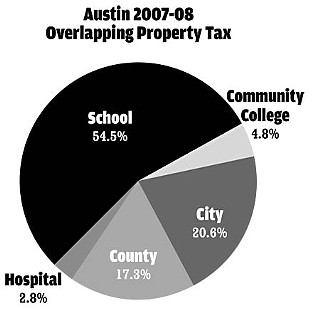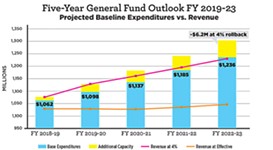Point Austin: Bare Necessities
Budget decisions are about money ... and justice
By Michael King, Fri., Aug. 15, 2008
The good news is that the great 2008 city public safety budget crisis has been averted once again by the heroic method of ... negotiation. First came ritual huffing and puffing from the Statesman's editors about the all-powerful public safety unions and how they control the City Council with their huge campaign bank accounts, and how they were attempting to bankrupt City Hall and the taxpayers with their outrageous contract demands, which city administrators must "unceremoniously reject." That was a nail-biting July 27 editorial ("Cops, firefighters must not get keys to vault this time"), foreboding the end of civilization as only the Statesman knows it.
Less than two weeks later came the whimper. As Tony Plohetski reported Aug. 8 ("Police, city near deal on raises, retirement"), city and police union negotiators have nearly agreed on a new contract that will provide raises in keeping with those to be offered to all city employees. ("According to the latest proposal," reported Plohetski, "officers would get a 2.5 percent pay increase next year and a 3 percent raise in each of the next three years.") In a lead that suggests the ponderous hand of one of those same editors, Plohetski reports that the tentative agreement could "potentially [end] tense negotiations concerning officer pay." So tense that they required a couple of weekly meetings to resolve. As the firefighter and EMS contracts tend to follow patterns established with the police union, there's no reason to expect that those negotiations should be any more troublesome.
As they had indicated weeks earlier, the various union reps didn't need the Statesman editors to tell them that the city budget would be tight this year, nor that it's a good moment to count their blessings (among the highest-paid public safety employees nationwide) and wait until the recession recedes. Presuming the police contract is confirmed and then approved by the membership, there will be one less manufactured melodrama to preoccupy City Council's budget deliberations.
The Third Party
Matters are less likely to resolve so readily over at Austin Independent School District, where the district administration and Education Austin, the teacher and staff union, remain at loggerheads over the proposed district budget and especially over proposed raises for faculty and staff. As the Chronicle's Richard Whittaker reports ("Budget Woes at AISD"), Superintendent Pat Forgione has proposed a 3% raise for this year (while hinting that flattening property values may no longer support it), while EA has asked for 5% this year and next for full-time faculty and staff, a $10 minimum (living) wage for hourly workers, a health insurance contribution from the district, and more money for library resources. Austin Interfaith has seconded the union's demands. AI spokesman Rev. Fred Krebs pointed out, "Teaching is no longer a middle-class job in Austin. A first-year teacher making $40,000 has to pay $12,000 out of pocket to insure his or her family on AISD's health plan."
It's painfully possible to review both the district's and the union's proposals and to come down firmly on both sides – which may well be the uncomfortable position of the board of trustees. Forgione points out that AISD is one of the only districts around that pays Social Security benefits, and he's aware that whatever the board approves, he has to take a tax vote to Austin voters during a year in which everyone's feeling the pinch of recession in combination with higher prices. (I doubt that too many Chronicle readers are contemplating comfortable raises this year.) But EA and its activist allies have simple justice on their side, especially on health insurance and a living wage for all employees, whose children inevitably attend public schools and hardly benefit when their parents have to juggle two or three jobs to make ends meet.
And as always, it needs reminding that in this tense standoff there's an unnamed third party, also known as the state of Texas. As a "rich district" (which just happens to be filled largely with poor students), AISD will this year return some $61 million more to the state under "recapture" (aka "Robin Hood") to be redistributed to even poorer districts and students. Because the Legislature has historically resisted every attempt at sufficient and equitable funding of the public schools, individual districts go to war over matters that should be common public welfare. Why are public school teachers and employees, for God's sake, reduced to begging school districts for health insurance? Ask your legislator.
Unequal Shares
The Lege's response, that we can't afford it, is of course pure-dee Texas bullshit. We're still paying for it, but badly, through local hospital districts and underfunded and overburdened emergency rooms, and even more stupidly in the schools through a property-tax system that depends on balkanized local property owners to assume every shared public cost, and on presumed-to-be-always-rising local property values to resolve every funding crisis. If you review the Austin property-tax burden (see graph), you see the lion's share (62.1%) going to the public schools and now to community colleges and the health-care district. The remainder, going to the city and county, is largely dedicated (as we have learned) to "public safety" – where we began this discussion.
Despite all the perennial moaning about "waste and fraud" supposedly weighing down public budgets, the real truth is that we have created a bottom-burdened system that stretches moderate- and low-income taxpayers to pay for bare public necessities. Meanwhile, the beneficiaries of all this largesse – major employers and their high-dollar corporate employees – flee our cities on state-subsidized highways ("no tolls!") to state-subsidized development infrastructure (tastefully gated) where they can congratulate themselves on their entrepreneurial independence and enroll their children in private schools.
And bare necessities is what the rest of us get. The traditional proud refrain is that Texas is a "low tax, low service" state, as if we were all brave yeomen and yeowomen homesteading on the Western plains, heroically sustained by flintlock rifles and hardscrabble pride. In fact, we live in a high-tax, low-service state, because we can't be bothered to establish a government that shares cost and responsibility equitably or sufficiently to sustain a community in which health care for teachers is not considered an unaffordable luxury.
Got something to say on the subject? Send a letter to the editor.











